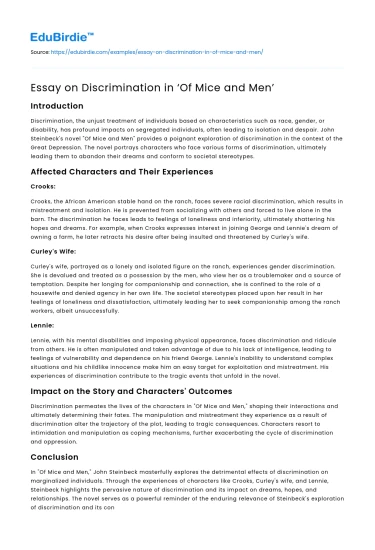Introduction
Discrimination, the unjust treatment of individuals based on characteristics such as race, gender, or disability, has profound impacts on segregated individuals, often leading to isolation and despair. John Steinbeck's novel "Of Mice and Men" provides a poignant exploration of discrimination in the context of the Great Depression. The novel portrays characters who face various forms of discrimination, ultimately leading them to abandon their dreams and conform to societal stereotypes.
Affected Characters and Their Experiences
Crooks:
Crooks, the African American stable hand on the ranch, faces severe racial discrimination, which results in mistreatment and isolation. He is prevented from socializing with others and forced to live alone in the barn. The discrimination he faces leads to feelings of loneliness and inferiority, ultimately shattering his hopes and dreams. For example, when Crooks expresses interest in joining George and Lennie's dream of owning a farm, he later retracts his desire after being insulted and threatened by Curley's wife.
Save your time!
We can take care of your essay
- Proper editing and formatting
- Free revision, title page, and bibliography
- Flexible prices and money-back guarantee
Curley's Wife:
Curley's wife, portrayed as a lonely and isolated figure on the ranch, experiences gender discrimination. She is devalued and treated as a possession by the men, who view her as a troublemaker and a source of temptation. Despite her longing for companionship and connection, she is confined to the role of a housewife and denied agency in her own life. The societal stereotypes placed upon her result in her feelings of loneliness and dissatisfaction, ultimately leading her to seek companionship among the ranch workers, albeit unsuccessfully.
Lennie:
Lennie, with his mental disabilities and imposing physical appearance, faces discrimination and ridicule from others. He is often manipulated and taken advantage of due to his lack of intelligence, leading to feelings of vulnerability and dependence on his friend George. Lennie's inability to understand complex situations and his childlike innocence make him an easy target for exploitation and mistreatment. His experiences of discrimination contribute to the tragic events that unfold in the novel.
Impact on the Story and Characters' Outcomes
Discrimination permeates the lives of the characters in "Of Mice and Men," shaping their interactions and ultimately determining their fates. The manipulation and mistreatment they experience as a result of discrimination alter the trajectory of the plot, leading to tragic consequences. Characters resort to intimidation and manipulation as coping mechanisms, further exacerbating the cycle of discrimination and oppression.
Conclusion
In "Of Mice and Men," John Steinbeck masterfully explores the detrimental effects of discrimination on marginalized individuals. Through the experiences of characters like Crooks, Curley's wife, and Lennie, Steinbeck highlights the pervasive nature of discrimination and its impact on dreams, hopes, and relationships. The novel serves as a powerful reminder of the enduring relevance of Steinbeck's exploration of discrimination and its consequences for marginalized individuals, urging readers to confront the injustices present in society.






 Stuck on your essay?
Stuck on your essay?

